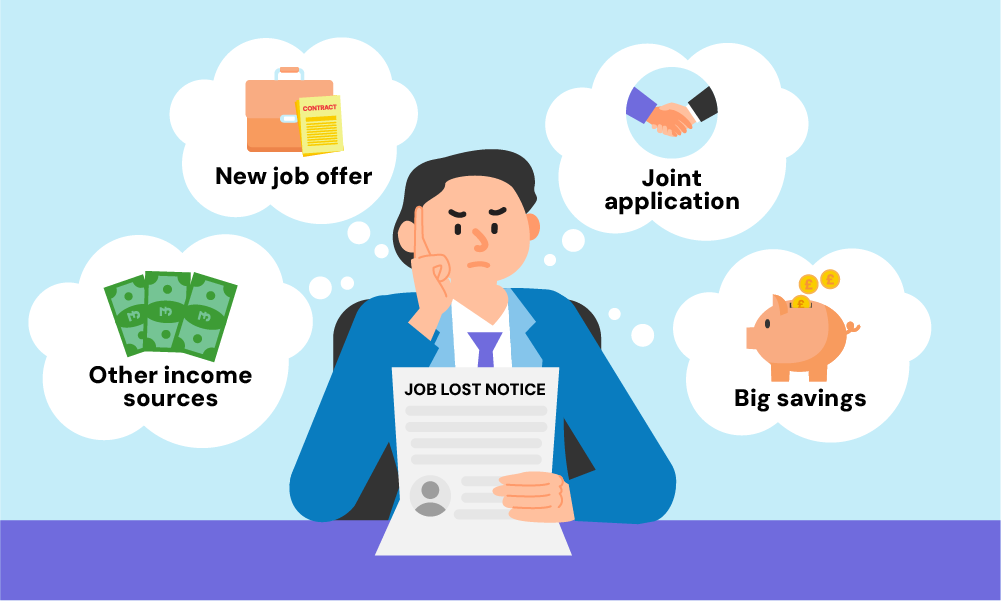What Happens If I Lose My Job After Exchanging Contracts?

Buying a home is one of the biggest financial decisions you’ll ever make.
The process of getting a mortgage, finding the right property, and going through all the legal matters can be quite stressful.
But what if disaster strikes after you’ve already exchanged contracts? Specifically, what if you lose your job between exchange and completion?
First, don’t worry.
Even though it’s a tough situation, it doesn’t mean your home purchase is off the table.
There are steps you can take to try to keep your deal on track. But you do need to act quickly and be fully transparent with your mortgage lender.
Can My Mortgage be Withdrawn If I’m Made Redundant?
Yes, your lender can pull your mortgage offer if you lose your job before completion.
Getting a mortgage relies heavily on proving you can afford the repayments with your income.
If you lose that income, the main reason they approved the mortgage disappears. That said, depending on your situation, your lender might be willing to review and adjust your mortgage instead of cancelling it altogether.
The key is to be honest with them about your situation as soon as possible.

Honesty Really Is the Best Policy
Some people may be tempted to try and hide a job loss from their mortgage lender, hoping it will ALL go through before the bank cottoned on.
But not only is this fraudulent, it’s incredibly risky.
Mortgage lenders can check your employment and finances anytime before the completion.
If they find out you hid a job loss, they can cancel your mortgage offer right away.
Worse yet, they might flag you with *CIFAS (Credit Industry Fraud Avoidance System), which makes getting any credit very hard in the future.
So as shocking as losing your job might be during this critical period, being open and transparent from the get-go is crucial.
Lenders know that redundancies happen—concealing it is only going to make the situation far worse.
*CIFAS (Credit Industry Fraud Avoidance System)
A UK organisation that keeps a list of fraud cases to help banks stop fraud. If you have a CIFAS record, it can make getting a mortgage harder due to increased scrutiny from lenders.
What Will My Lender’s Response Be?
A job loss doesn’t automatically mean your mortgage offer is gone.
If you’re honest with your lender, they’ll likely try to find ways to keep your purchase on track. The key is having other sources of income.
For example, if you’re buying with a partner and only one of you loses a job, your combined income might still be enough. Significant savings or a new job offer soon can also reassure them.
The lender will need to review your finances again, including income, expenses, debts, and any changes to your deposit amount.
Depending on the new situation, they might ask for a BIGGER deposit.
If your new finances meet their requirements, they’ll reissue the mortgage offer, possibly with changes to the loan size or interest rate.

How Long Will This Process Take?
Getting your mortgage reassessed will likely delay your house purchase.
Since there’s often a tight deadline between exchanging contracts and completing the sale, any delay in the lender’s review might be unacceptable to the seller.
This is why it’s vital to keep your estate agent and the seller’s solicitors updated. They might be willing to push back the completion date a bit if there’s a good chance the sale will still go through.
However, if the delays seem too long, you might be forced to pull out of the sale altogether.
In that case, you’ll lose your 10% deposit (remember, contracts are already exchanged) along with any fees you’ve paid for conveyancing, surveys, brokers, and your mortgage application.
It’s a financial setback, but income protection or mortgage insurance could help ease the burden.
Have a Backup Plan If It All Falls Through
If the seller won’t budge on the completion date and you can’t get an extension, you might have to pull out of the sale and lose your deposit. The goal then is to limit the damage.
Losing your job while buying a house is a big blow. It can cost you a lot of money. But by being honest with your lender, you can still keep your dream of homeownership alive, even if it’s delayed.
If the lender can’t help you, you’ll need to restart the house-buying process from scratch. It’s disappointing, but not the end.
Once you’re back on your feet financially, you might be able to consider other options you couldn’t before, like using a mortgage guarantor, getting a longer fixed-rate mortgage, or exploring shared ownership schemes.
How to Save Your Home Purchase After a Job Loss?
Here are additional steps you can take to potentially save your purchase:
- Consider a Co-Signer – If possible, ask a family member or close friend to co-sign the mortgage. This can provide the lender with additional assurance of your ability to make payments.
- Bridge Finance – Explore the possibility of obtaining a bridge loan. This short-term loan can provide the necessary funds to complete the purchase while you secure new employment.
- Reduce Expenses – Cut down on non-essential expenses to conserve cash for your mortgage payments. This can demonstrate to your lender that you are taking steps to manage your finances responsibly.
- Sell Other Assets – If you have other assets, consider selling them to raise funds for your mortgage payments. This can provide temporary relief while you navigate this period.
- Emergency Savings – Utilise any emergency savings you have to cover your mortgage payments temporarily. This can buy you time to secure a new job and stabilise your finances.
Remember, maintaining open communication with your lender is important. Being honest about your situation can make them more willing to help you find a solution.
The Bottom Line
Buying a house is a huge step, and things rarely go perfectly. Losing your job after exchanging contracts doesn’t have to kill your dream of homeownership.
Be honest with your lender and have a realistic backup plan. This way, you can navigate this stressful situation without losing everything you’ve put in, both your money and your excitement.

If you need help, start by consulting a qualified mortgage broker. They can offer you expert advice, talk to lenders, and help find solutions.
With them, you can manage this stressful situation and keep your dream alive without losing your investment or excitement.
For a free, no-obligation consultation with a good mortgage broker, get in touch with us.
Get Matched With Your Dream Mortgage Advisor...

Frequently asked questions
What happens when contracts are exchanged?
When contracts are exchanged, the sale becomes legally binding. Both buyer and seller sign contracts and agree on a completion date. You must pay a deposit at this stage, usually 5-10% of the purchase price.
What happens if you exchange contracts but do not complete them?
If you exchange contracts but do not complete them, you risk losing your deposit. The seller can also sue you for breach of contract and claim additional costs incurred due to the delay.
How long does it take to complete after contracts are exchanged?
Completion typically takes place 1-2 weeks after contracts are exchanged, but the timeframe can vary depending on the agreement between the buyer and seller.
Can I change jobs after the exchange of contracts but before the mortgage completion?
Yes, but it can be risky. Changing jobs during this period can complicate your mortgage approval. Inform your lender immediately, as they may need to reassess your financial situation.
A mortgage broker can help you navigate this process and advise you on the best steps to take.
Can I move in after the exchange of contracts?
No, you cannot move in after the exchange of contracts. You can only move in once the sale is completed and you have the keys, which is typically on the completion date.
Can I change my job after completion?
Yes, you can change your job after completion. However, ensure you can still meet your mortgage payments with your new job’s income.




